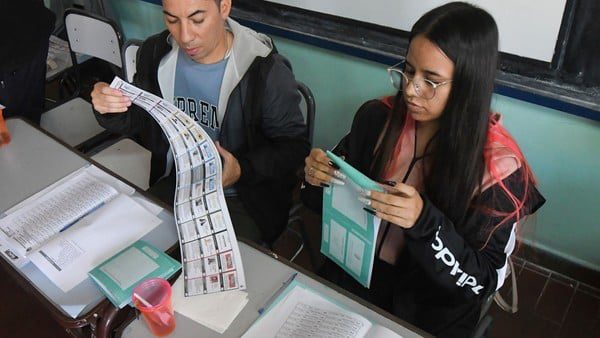Global Courant 2023-05-01 08:14:46
Mendoza began its schedule of primary elections this Sunday in seven communes governed by parties opposed to the provincial government of the radical Rodolfo Suarez (Cambia Mendoza). The result was sung: the majority was inclined to vote for the ruling party, although there was surprise on some electoral fronts.
Election day also meant the launch of the single ballot to ensure equal conditions for all parties and reduce printing costs. There was low participation, 65% of the register voted.
The municipalities that voted for the PASO in the category of mayor and councillors, separated from the rest of the province, are La Paz (PJ-Kirchnerismo), Lavalle (PJ), Maipú (PJ), San Carlos (Renewal Front), Santa Rosa ( PJ Kirchnerismo), San Rafael (PJ) and Tunuyán (PJ).
The Elegí Front, as the group that brings together Peronists and Kirchnerists is called, is in the best position to maintain six of the seven communes, in the final elections that for these communes will be on September 3.
The case of the municipality of San Carlos, in the Uco Valley, is special. The current mayor Rolando Scanio called for elections as part of the ruling party because Sergio Massa’s Frente Renovador was in Cambio Mendoza, with UCR and PRO.
However, a month ago, the leaders of the Frente Renovador de San Carlos jumped into the political space La Unión Mendocina, created by PRO deputy Omar De Marchi, an enemy of the radical Alfredo Cornejo, candidate for governor for Together for Change in Mendoza.
In the vineyard municipality of San Carlos, the victory went to the municipal ruling party that responds to the Massista leader Sergio Difonso, an ally of De Marchi. “This triumph has a symbolic value since it is the birthplace of Alfredo Cornejo and the current governor Rodolfo Suarez,” said De Marchi, who joined the festivities as a candidate for governor.
few re-elections
Of the mayors who called for separate elections, three cannot run for reelection because the Mendoza Electoral Law only allows one consecutive reelection of mayors and legislative positions.
In Maipú, the Peronist Matías Stevanato managed to place himself in first place with 48% of the votes. Since 1983 this commune of Greater Mendoza has been governed by the PJ.
“It is a vote of confidence once again for the Maipú team. A team that has been governing and has empathy, that is close to its neighbors and shows, once again, that it knows how to govern,” said the current mayor who is best positioned for the generals.
Matias Stevanato, mayor of Maipú, at the time of casting his vote in Mendoza. Photo Jose Gutierrez / Los Andes
The UCR, meanwhile, got 28% of the votes and will have to put all its hopes in its current president of the deliberative council Mauricio Pinti Clop, the radical pre-candidate with the most votes. His victory in the Frente Cambia Mendoza was a blow when he beat Cornejo’s favorite candidate, the Undersecretary for Institutional Relations, Néstor Majul,
In San Rafael, the majority voted in favor of the Peronist hegemony of the Felix brothers. The current mayor Emir Félix cannot compete because he reached the re-election limit and proposed his brother Omar Félix, who already governed from 2003 to 2010.
The Félix family, who have been in charge of the main city in southern Mendoza for 20 years, prevailed in these primaries over the candidate for La Cámpora, the current councilor Nadir Yasuff.
The pro-government Frente Elegí (PJ Kirchnerismo) in San Rafael got 40% of the votes. But, Cambia Mendoza (UCR, PRO) obtained 35%, adding the three candidates who presented themselves and there is enthusiasm because they were very close.
The doctor Abel Freidemberg was the winner of the opposition Frente Cambia Mendoza and will be a candidate for mayor of that commune. The Libertarian Front was in third place, with 10% of the votes.
In Tunuyán, the current mayor Martín Aveiro (PJ) nominated Emir Andraos, since he cannot go for another re-election after 12 years in office, he presented himself as the first candidate for councilor.
Andraos obtained 45.82% of the votes; while Cambia Mendoza got 32.55% and it was the radical Luis López who won in that internship.
In the communes of Este Mendoza, La Paz and Santa Rosa, Kirchnerism managed to maintain the leadership achieved by the current mayors Flor Destéfanis and Fernando Ubieta, aligned with La Cámpora.
Destéfanis, current mayor and former queen of the Harvest, obtained 52.14% of the votes in Santa Rosa and Ubieta, 48%, in La Paz. Both were without internal competition and are betting on re-election on September 3.
The Mendoza Cambia Front was second in the two communes of the East. The big surprise of the elections was Leo Fernández, a young man who chairs the PRO of Santa Rosa and won the internal party of the party led by Governor Suarez.
In Lavalle, after 22 years in office, the Peronist mayor Roberto Righi intended to leave the current senator and former Lavalle official, Gerardo Vaquer, in his post. However, the voters voted for another PJ candidate who disobeyed the communal government.
The provincial deputy Edgardo González (PJ) decided to present himself, against the will of the current mayor, in the inmate in the Elegí Front. It was another surprise: González won on the Peronist list and will be the one who competes for the Frente Elegí in that commune.
For Cambia Mendoza in Lavalle, the radical Lucas Luppo prevailed, in a front that obtained only 16% of the votes.
Single Ticket in Mendoza
PASO elections in 7 departments of the province of Mendoza. At the Celina Álvarez school in the department of Maipú, citizens enter to vote without problems, launching the single paper ballot system to elect their candidates Photo:José Gutierrez / Los Andes
The Single Electoral Ballot Law that Mendoza launched concentrates all the electoral offer on a single piece of paper. It was approved by provincial law on March 16. It contains columns with the candidates and rows with the political parties to which they correspond.
You can vote for the complete list, or choose the candidate for mayor of a Political Front and the councilors of another. That is decided by the person, who instead of voting in a dark room, as was the previous system, now votes behind a screen, in a classroom.
It may happen that the voter makes a mistake and marks twice for a pre-candidate for mayor, or twice for pre-candidates for councillors, so the vote would be annulled. If this happens and the person notices it before placing the ballot in the ballot box, he can ask for another ballot.
The elections for governor and provincial offices will also be separated from the national ones: on June 11 the primaries and on September 24, the general ones. Then it will be the turn of the national elections, on August 13 and October 22 and, if the ballot is reached, part of Mendoza will go to the polls seven times during 2023.
DS




